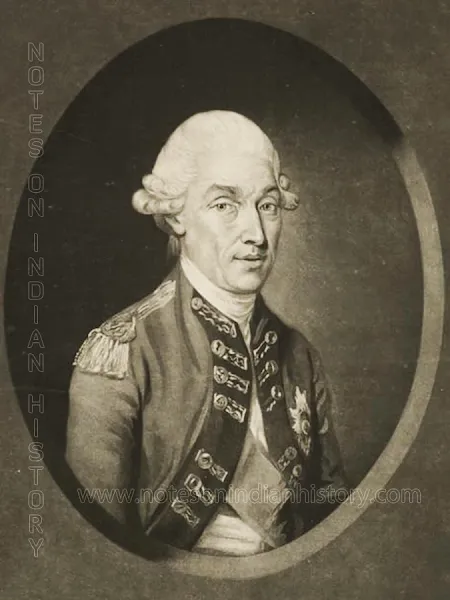Last Battle Between Hyder Ali and Sir Eyre Coote: Hyder's Victory at Arni
Nawab Hyder Ali Khan of Mysore (r: 1761-1782) succumbed to cancer on December 7, 1782, in Narasingarayanipet, located near Chittoor in Andhra Pradesh, amidst the Second Anglo-Mysore War (1780-1784). He had gone to Chittoor to celebrate Muharram. At the time of his death, Hyder Ali was sixty years old.
During the second Anglo-Mysore war, Hyder Ali was defeated by the British General, Sir Eyre Coote, in three consecutive battles at Porto Novo, Pollilur and Sholinghur.
On June 2, 1782, Hyder and Eyre Coote met again at Arni, located in the state of Karnataka. This encounter marked the final showdown between the two formidable adversaries. The Hyder Nama, a Kannada work authored by Karnik Nallappa, provides significant insights into this historic battle.
In 1782, Hyder Ali captured Peramakallu and Nagaratagada. Shortly thereafter, two French Generals, along with 2000 troops, joined Hyder at Peramakallu, while a larger army under Mons. Bussy was en route.
In May 1782, the British army started from Madras, dividing itself into two parts, the smaller contingent headed towards Vellore, while the larger encamped near Arni.
Upon receiving the news, Hyder strategically divided his army into four parts. The first was the army of the Poligars, followed by the army under Monsieur Lally and Muhammad Ali. The third division was led by his son, Tipu Sultan, and the largest division was under Hyder's direct command. This strategic arrangement allowed for a coordinated attack on the British from all sides, while Hyder himself swiftly marched towards Arni. The British laid siege to the fort, but the killedar of Arni defended it bravely.
On 2nd June, Tipu's army launched a fierce attack against the British. The British divided their forces into two separate divisions to engage in battle. The regiment under Lally also arrived on the scene. As the fighting intensified, Eyre Coote found himself under attack from the combined armies of Tipu and Lally, while the Poligars appeared unexpectedly, forcing the British to form four divisions to defend themselves. Just when they thought they had seen it all, the army of Hyder arrived, plunging the British into a state of utter confusion. In the end, the British were forced to retreat towards Vellore, with Hyder in hot pursuit. The British suffered heavy losses, with many killed and nearly 2000 men captured.
In the aftermath of the battle, the British at Madras were left with no choice but to sue for peace. They sent two ambassadors to propose terms with Hyder, offering to cede Karnatakagada, Satagada and other districts worth 10 lakhs to Hyder, and pay Rs. 3 crores towards the army expenses. The treaty was to be signed between Hyder, the British, Muhammad Ali Khan Wallajah and Nizam Ali.
However, Hyder had his own demands. He insisted on the surrender of the fort of Trichinopoly [Trichy now known as Tiruchirappalli], which had been promised to Mysore when Karachuri Nanjarajaiya helped Muhammad Ali Khan Wallajah. Hyder also demanded the cession of Vellore and other territories he had taken during the war. Furthermore, he sought a refund of the expenses incurred by Mysore during the siege of Trichinopoly in 1748, along with the amount borrowed from Karachuri Nanjarajaiya with interest up-to-date. If these demands were not met, the war would continue.
In August 1782, Hyder Ali was informed of a Nair revolt in Malabar. To make matters worse, a British army had also arrived in the vicinity. So he dispatched Tipu to Malabar.
In November, Hyder was diagnosed with a malignant carbuncle on his back. On the afternoon of 7 December, he called his five most trusted officers: Abu Muhammad Mirde, Mir Muhammad Sadik, Krishna Rao, Purnaiya and Anchegurikar Shamiah. Hyder made a heartfelt request that, upon his passing, they continue to serve under his son with the same loyalty and dedication they had shown him. Tragically, Hyder passed away on that very same day.
At that time, his son and successor, Tipu Sultan, was away in Ponnani, a town located in Malabar. It was Purnaiya who suggested that the news of Hyder's demise should be kept under wraps until Tipu's arrival. Krisha Rao and others agreed to this plan, and Hyder's remains were secretly transported to Kolar in a chest resembling some valuable spoil, with orders for its preservation. In the meantime, messengers were dispatched to Malabar to summon Tipu Sultan back immediately.
Hyder's severe illness had raised suspicions among the people, and news of this had already spread, even reaching the British. However, before the British could take any action, Tipu had already reached his father's camp by the end of December.
Tipu Sultan at Ponnani:
In August of 1782, the Bombay Government dispatched a force to invade Malabar, led by Colonel Humberstone. The troops successfully seized Calicut and continued their advance towards Palakkad. However, their triumph was short-lived, as Tipu, who had been ordered by his father to oppose the British, arrived in October of the same year. Colonel Humberstone retreated to Ponnani in November, where he was joined by General MacLeod and a reinforcement from Bombay. Tipu arrived in Ponnani and, with the help of Lally, launched a fierce attack on the British lines. Despite his efforts, he was repulsed and forced to retreat. Tipu Sultan then crossed the Ponnani river and waited for reinforcements. However, on December 12th, he received the news of his father's death and immediately rushed back to Mysore.
Therefore, it is evident that Hyder's final battle resulted in a victory over Coote. This significant event is also documented in the book "Captain Henry Martin Beare (1760-1828): Life, Ancestry, and Descendants." It's worth noting that Sir Eyre Coote passed away just four months after Hyder's death, on April 28th, 1783.



Comments